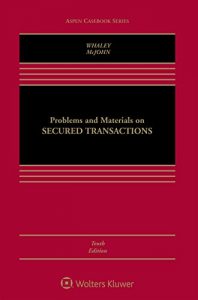Brief, clear, and extremely accessible, Problems and Materials on Secured Transactions helps students understand black letter law and the statutory language in the Uniform Commercial Code. Concise yet comprehensive coverage includes the most recent case and statutory developments. A sensible, flexible organization makes it adaptable to many teaching styles. Drawing on experience in both teaching and writing, the authors provide thorough and practical coverage using a popular problems approach with interesting fact patterns. The text’s effective format, manageable length, and inclusion of the most important cases make Problems and Materials on Secured Transactions concise and efficient.
Hallmark features of Problems and Materials on Secured Transactions
• Popular problems approach—straightforward and practical problems, with interesting fact patterns, explore different portions of the Uniform Commercial Code
• Clear and lucid writing style
• Important, teachable, and interesting cases
• Manageable length—concise, efficient, and effective format
• Flexible content and organization– adaptable to many teaching styles
• Effective format makes black letter law accessible and helps students understand statutory language
• Thorough and up-to-date—covers the latest changes in (and cases relating to) U.C.C. Article 9, as well as other relevant laws and cases
• Distinguished authorship—draws on experience in both teaching and writing
Thoroughly updated, the Tenth Edition presents:
• A introduction to the UCC
• Multiple-choice assessment questions, with analysis, for each chapter
• New cases, including 1st Source Bank v. Wilson Bank & Trust; Eleventh Circuit holding that violation of automatic stay in bankruptcy may give rise to damages for emotion distress; Thompson-Young v. Wells Fargo Dealer Services; Mishcon de Reya New York LLP v. Grail Semiconductor; Prairie State Bank & Trust v. Deere Park Associates;); McDonald v. Yarchenko
• How the 2010 amendments to the UCC on determining the name of an individual for filing affect lenders, their attorneys, and the courts, along with discussion of state filing office procedures
• The effect of online filing practices
• State procedures to deal with bogus and fraudulent financing statements
• New technologies and repossession: remote disabling, GPS location, self-driving cars
• Intersections between secured transactions and contract law: errors in security agreements, scope of security interest in intellectual property
• Whether bank may lose security interest in car due to forged release of lien.
• A case that may make students tremble, in which a misfiled termination statement caused a law firm’s client to lose $1.5 billion in collateral












